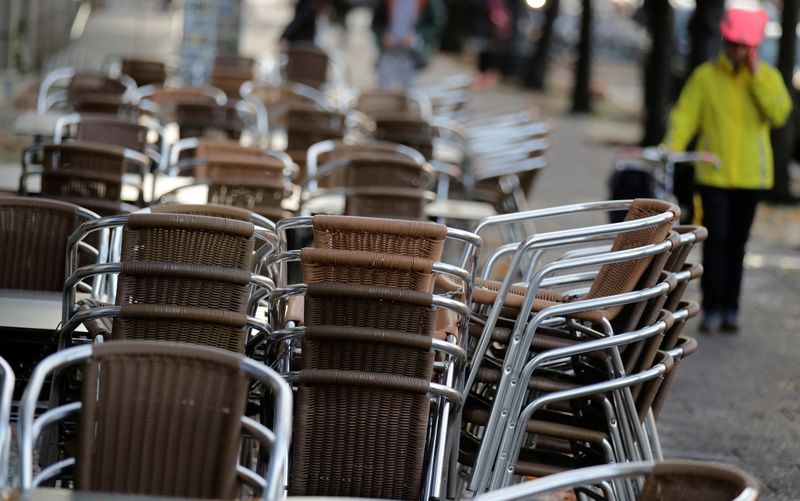LONDON (Reuters) - The euro zone's economic recovery stalled last month as a second wave of coronavirus cases and restrictions imposed to try and contain it whacked activity in the bloc's dominant service industry, pointing to a double-dip recession, a survey showed.
Alongside their peers, Germany and France -- the 19-country bloc's two biggest economies -- have reimposed tough lockdown measures, likely dealing a heavy blow this month as restaurants, gyms and shops remain closed and citizens stay at home.
"With lockdown measures being tightened, it is becoming increasingly hard to see how the euro zone economy will avoid falling back into decline," said Chris Williamson, chief business economist at survey compiler IHS Markit.
"For all countries the outlook has grown increasingly dark."
The euro zone economy contracted 11.8% in the second quarter but expanded a much-better-than-expected 12.7% in July-September after many lockdown restrictions were eased, official data showed on Friday.
But rising coronavirus cases pose a serious risk to the bloc's recovery, a Reuters poll said last month, and IHS Markit's final Composite Purchasing Managers' Index, seen as a good gauge of economic health, dropped to 50.0 last month from September's 50.4, although above a preliminary reading of 49.4. [ECILT/EU]
That was bang on the 50 mark which separates growth from contraction and was dragged down by the services PMI which fell to 46.9 from 48.0, its lowest since May when the first wave of the virus was sweeping across Europe.
"Service providers have been hit especially hard, led by intensifying weakness in consumer-facing sectors such as hospitality, offsetting the brighter news seen in manufacturing during the month," Williamson said. [EU/PMIM]
The IHS Markit survey was conducted largely before many of the new restrictions were put in place across Europe but forward-looking indicators were already bleak.
Services firms cut headcount for an eighth month, demand dropped further, backlogs of work were again depleted and optimism waned. The business expectations index sank to 54.2 from 59.2, and it has mostly only ever been lower this year and during the last two financial crises.
To offer support, the European Central Bank committed last week to take new action in December to contain the growing fallout, having already pumped in unprecedented stimulus.
The Bank's policy mandate is to have inflation just below 2% but it registered -0.3% in October, official flash data showed, so policymakers are likely to be disappointed to see firms cutting prices to drum up demand.
Despite input costs rising sharply, the composite output prices index was firmly below breakeven at 49.2, albeit above September's 47.8.
